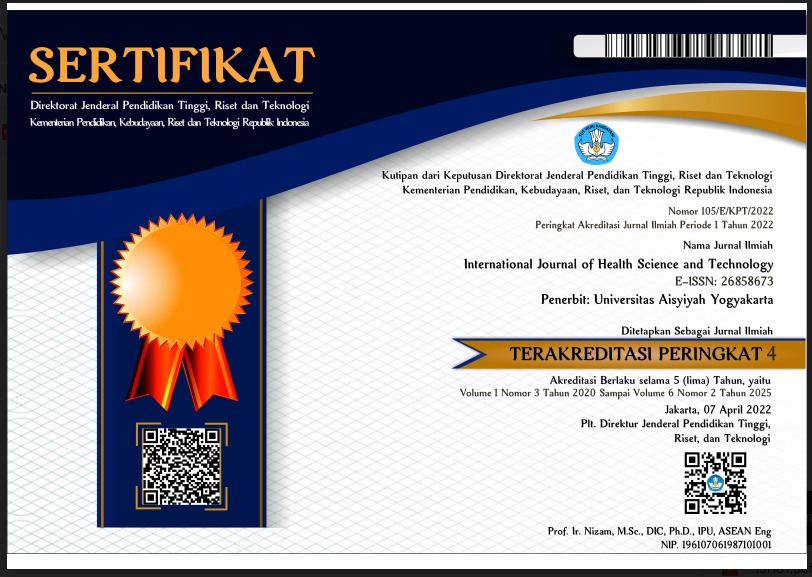The role of zinc in the management of covid-19 patients: literature review
DOI:
https://doi.org/10.31101/ijhst.v5i1.2861Kata Kunci:
COVID-19, zinc, therapyAbstrak
Referensi
Abd-Elsalam, S., Soliman, S., Esmail, E. S., Khalaf, M., Mostafa, E. F., Medhat, M. A., Ahmed, O. A., El Ghafar, M. S. A., Alboraie, M., & Hassany, S. M. (2021). Do Zinc Supplements Enhance the Clinical Efficacy of Hydroxychloroquine?: a Randomized, Multicenter Trial. Biological Trace Element Research, 199(10), 3642–3646. https://doi.org/10.1007/s12011-020-02512-1
Al Sulaiman, K., Aljuhani, O., Al Shaya, A. I., Kharbosh, A., Kensara, R., Al Guwairy, A., Alharbi, A., Algarni, R., Al Harbi, S., Vishwakarma, R., & Korayem, G. B. (2021). Evaluation of zinc sulfate as an adjunctive therapy in COVID-19 critically ill patients: a two center propensity-score matched study. Critical Care, 25(1), 1–8. https://doi.org/10.1186/s13054-021-03785-1
Carlucci, P. M., Ahuja, T., Petrilli, C., Rajagopalan, H., Jones, S., & Rahimian, J. (2020). Zinc sulfate in combination with a zinc ionophore may improve outcomes in hospitalized COVID-19 patients. Journal of Medical Microbiology, 69(10), 1228–1234. https://doi.org/10.1099/jmm.0.001250
Derwand, R., Scholz, M., & Zelenko, V. (2020). Since January 2020 Elsevier has created a COVID-19 resource centre with free information in English and Mandarin on the novel coronavirus COVID- 19 . The COVID-19 resource centre is hosted on Elsevier Connect , the company’s public news and information. January.
Frontera, J. A., Rahimian, J. O., Yaghi, S., Liu, M., Lewis, A., de Havenon, A., Mainali, S., Huang, J., Scher, E., Wisniewski, T., Troxel, A. B., Meropol, S., Balcer, L. J., & Galetta, S. L. (2020). Treatment with Zinc is Associated with Reduced In-Hospital Mortality Among COVID-19 Patients: A Multi-Center Cohort Study. Research Square, 1–10. https://doi.org/10.21203/rs.3.rs-94509/v1
Jothimani, D., Kailasam, E., Danielraj, S., Nallathambi, B., Ramachandran, H., Sekar, P., Manoharan, S., Ramani, V., Narasimhan, G., Kaliamoorthy, I., & Rela, M. (2020). COVID-19: Poor outcomes in patients with zinc deficiency. International Journal of Infectious Diseases, pp. 100, 343–349. https://doi.org/10.1016/j.ijid.2020.09.014
Kemenkes RI. Situasi COVID-19. Kementerian Kesehatan RI. 2021. https://infeksiemerging.kemkes.go.id
Levani, Prastya, & Mawaddatunnadila. (2021). Coronavirus Disease 2019 (COVID-19): Patogenesis, Manifestasi Klinis dan Pilihan Terapi. Jurnal Kedokteran Dan Kesehatan, 17(1), 44–57. https://jurnal.umj.ac.id/index.php/JKK/article/view/6340
Pal, A., Squitti, R., Picozza, M., Pawar, A., Rongioletti, M., Dutta, A. K., Sahoo, S., Goswami, K., Sharma, P., & Prasad, R. (2021). Zinc and COVID-19: Basis of Current Clinical Trials. Biological Trace Element Research, 199(8), 2882–2892. https://doi.org/10.1007/s12011-020-02437-9
Perera, M., El Khoury, J., Chinni, V., Bolton, D., Qu, L., Johnson, P., Trubiano, J., McDonald, C. F., Jones, D., Bellomo, R., Patel, O., & Ischia, J. (2020). Randomised controlled trial for high-dose intravenous zinc as adjunctive therapy in SARS-CoV- 2 (COVID-19) positive critically ill patients: Trial protocol. BMJ Open, 10(12), 1–9. https://doi.org/10.1136/bmjopen-2020-040580
Thomas, S., Patel, D., Bittel, B., Wolski, K., Wang, Q., Kumar, A., Il’Giovine, Z. J., Mehra, R., McWilliams, C., Nissen, S. E., & Desai, M. Y. (2021). Effect of High-Dose Zinc and Ascorbic Acid Supplementation vs Usual Care on Symptom Length and Reduction among Ambulatory Patients with SARS-CoV-2 Infection: The COVID A to Z Randomized Clinical Trial. JAMA Network Open, 4(2), 1–10. https://doi.org/10.1001/jamanetworkopen.2021.0369
Yao, J. S., Paguio, J. A., Dee, E. C., Tan, H. C., Moulick, A., Milazzo, C., Jurado, J., Della Penna, N., & Celi, L. A. (2021). The Minimal Effect of Zinc on the Survival of Hospitalized Patients With COVID-19: An Observational Study. Chest, 159(1), 108–111. https://doi.org/10.1016/j.chest.2020.06.082
Unduhan
Diterbitkan
Cara Mengutip
Terbitan
Bagian
Citation Check
Lisensi
International Journal of Health Science and Technology allows readers to read, download, copy, distribute, print, search, or link to its articles' full texts and allows readers to use them for any other lawful purpose. The journal allows the author(s) to hold the copyright without restrictions. Finally, the journal allows the author(s) to retain publishing rights without restrictions
- Authors are allowed to archive their submitted article in an open access repository
- Authors are allowed to archive the final published article in an open access repository with an acknowledgment of its initial publication in this journal

This work is licensed under a Creative Commons Attribution-ShareAlike 4.0 Generic License.










